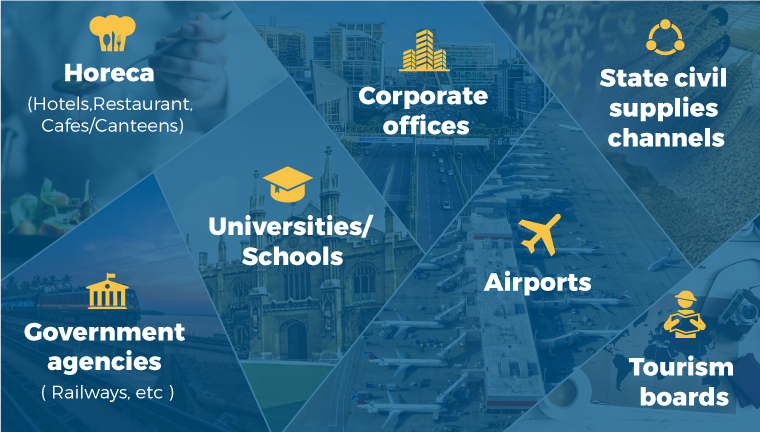Table of Contents
Toggle‘Relationship experts’.
That’s what we jokingly call our sales team. But technically, we are right. In any company, the salespeople are the ones who nurture relationships with customers whether they are your distributors or institutional customers. The complexity is exponentially higher if it’s a business-to-business relationship because that means multiple stakeholders, a longer sales cycle and a bigger deal size.
As Gaurav Rustagi, former Country Director for HUL UAE says, “In any sales process, there are 4 key elements: Make, Sell, Deliver and Collect. Depending on your customer, your focus on each of these elements will be different. For e.g., if you are selling to a distributor, your focus may be more on Sell and Collect, because the other 2 processes are well in your control However, if it’s an institutional account your priority may be on Make and Deliver.”
For e.g. Kansai Nerolac will offer its range of home colours to retail distributors and focus on order fulfilment and regular collections. However, to sell their industrial paints to large realtors, industries or government institutions, they might need to make special colours or unique SKUs and focus on timely delivery.
Now imagine hundreds and thousands of such institutional or B2B leads under process simultaneously, each at a different stage of nurturing. That can become a nightmare if you don’t have the right systems to monitor your leads funnel!
A majority of Sales Heads face such kind of challenges when it comes to managing institutional sales and B2B sales. Unfortunately, quite a few follow the same lead nurturing and account management process for both categories.
Institutional Sales Vs B2B Accounts: Are they different?
One big difference between institutional customers and B2B customers is the deal size, which is usually exponentially higher for institutional accounts e.g. Railways, CSD (Canteen Stores Department) and other government institutions and ministries. The second difference is that a B2B account will use your product to create value as an intermediary while also keeping an eye on profitability. An institutional account will use your product more to create value for the end consumer, and less for commercial considerations.
For e.g. if Signify (formerly known as Philips Lighting) wins the account for, say, a large MNC to install the lighting for all their new offices, that’s a B2B relationship. But when it illuminates the 78-year-old iconic Howrah Bridge, then that’s an institutional relationship.
Customer engagement protocols, therefore, should ideally be different for both. We know that all companies have basic protocols in place for customer engagement. For e.g.
- The Key Account Manager will do X number of meetings in a month
- The RSM will do Y number meetings in a quarter
- The Head of Institutional Sales or Key Accounts will do Z number of meetings with the customer in 6 months.
- The TAT for a query is 24 hours
- The protocols are defined for Level 1,2 and 3 escalation
Some accounts take longer to convert and therefore some require more frequent follow-ups or repeated nudges. Some accounts require higher-ups to be involved, and some others want more details, repeated demos or more number of meetings to finally take a decision. And we know you have defined protocols for most of these things. But how sure are you that these protocols are being followed to the T?
And what about the ad-hoc queries, meeting requests, red flags, escalations etc. that come up in the interim? In this entire process, it is the repetitive nature and documentation of these interactions that is the biggest challenge for sales teams irrespective of which industry they are in.
That was the case too for Vivek Kesari, Head of Central Marketing for Tolaram Nigeria. “My teams used to manage data manually on CDs, which seemed like we were still working in the 90s. I knew I had to make a shift very soon.”
Power your B2B & Institutional Relationships With Automated Workflows
Technology for automating workflows has been around for quite some time now. But as is with any technology, finding the right one can be the difference between growing steadily and growing at full speed. Find a solution that keeps the nuances of your business in mind and one that’s user-friendly.
With FieldAssist Flo, you get a No-Code, customized solution that offers Full Flexibility to Schedule Projects. This makes it very easy for your on-field team to categories accounts into Institutional or B2B, fetch relevant documents & forms, create PDFs, enforce deadline-based service agreements, develop reports etc. That’s how the largest packaged drinking water brand in the country strengthened its B2B sales.
Using our platform, Bisleri India has been able to strategically manage 13000 + institutional relationships for incremental lead conversion. Their team of 120 B2B salespeople logged in more than 5000 monthly Customer Visits and created a list of nearly 15000 prospective clients.
As Flo allows for rule-defined workflows to simplify processes, they also achieved Greater Process Compliance by getting real-time visibility on their team’s activity-related KPIs along with trends to assess active and inactive users, their login time, daily progress etc.
Another customer, RR Global, a leading electrical equipment company that makes cables and wires, electromechanical parking systems, winding and magnet wires etc. uses FieldAssist Flo to get Critical Field Visibility with Custom-Built Reports to manage a salesforce of 240+ people.
Read More: How to Move from Intuition to Evidence-Based Decision Making
“We logged more than 24,000 inquiries in FY 2022, recorded more than 11,000 monthly B2B visits and converted more than 1350 inquiries! FieldAssist Flo has been a game-changer!”
With custom-built charts, graphs, and tabular data with logical checks, RR Global uses filters or order formats to analyse the individual performance of salespeople, identify the top performing members as well as leads source, inquiry type, leads per stage of progression etc.
In a sales process, decision-making conversations are hot for a very short window of time. So how do you create empowerment in the system which is fueled by the knowledge required, so that people can take a decision and move forward? The answer is right in front of you.
FieldAssist can help you see a tangible impact on your growth as well as improve the ROI on your sales workflows.
Contact us for more details
About Post Author
Chitransh Jain
A problem solver at his core, Chitransh is best at identifying strategic opportunities and executing action plans with great attention to detail. His eagerness to take up challenging tasks while upskilling continuously allows him to deliver impactful results.




